Dr. Fauci ‘I don’t recall’ Said174 times Deposed About Collusion with Social Media
WASHINGTON (TND) — An almost 400-page deposition of Dr. Anthony Fauci, the director of the National Institute of Allergy and Infectious Diseases (NIAID) and the president’s chief medical advisor, was released Monday.
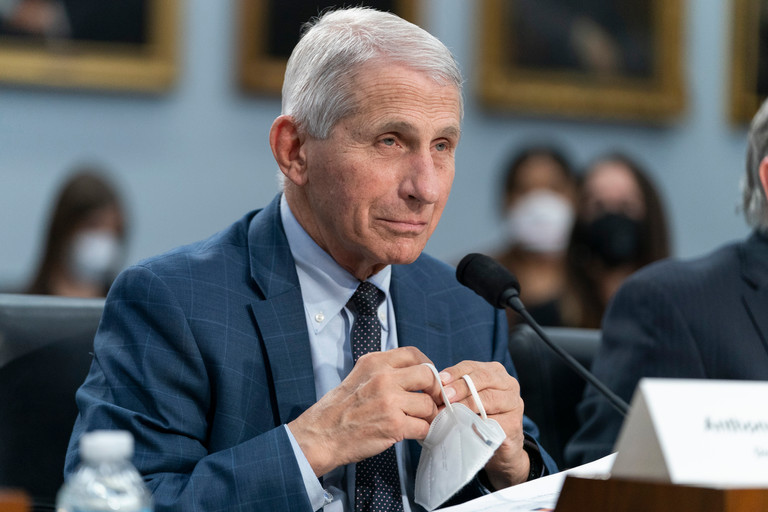
The deposition stems from a lawsuit launched in May by two state attorneys general seeking to uncover if any potential collusion between Fauci, or other members of the Biden administration, and social media companies took place.
READ MORE: “Biden admin colluded with social media companies to censor speech, state AGs say”
According to Missouri Attorney General Eric Schmitt, who helped initiate the investigation alongside Louisiana Attorney General Jeff Landry, Fauci said “I don’t recall” 174 times “including when asked about emails that he sent, interviews that he gave, and other important information.”
“Missouri and Louisiana are leading the way in exposing how the federal government and the Biden Administration worked with social media to censor speech. In our deposition with Dr. Fauci, it
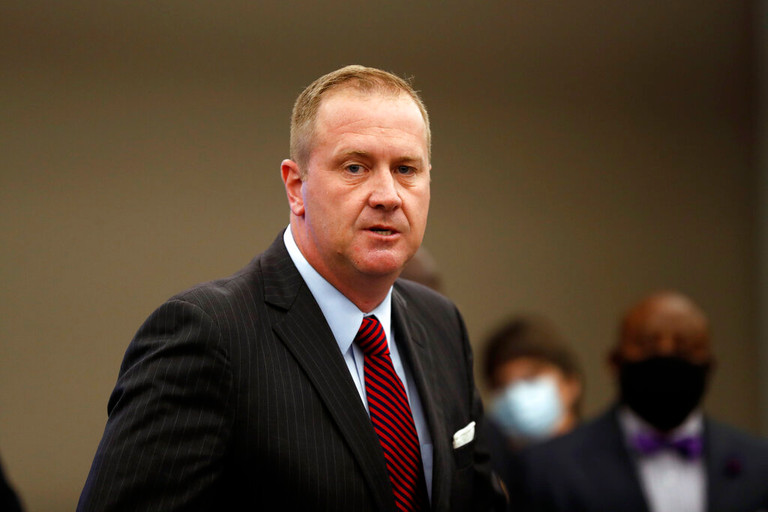
became clear that when Dr. Fauci speaks, social media censors,” Schmitt said, according to a news release from his office. “I encourage everyone to read the deposition transcript and see exactly how Dr. Fauci operates, and exactly how the COVID tyranny that ruined lives and destroyed businesses was born.”
During the deposition, which was conducted by Missouri Solicitor General John Sauer, Fauci was asked for his thoughts on whether people should be allowed to post opinions on social media.
“You say ‘allowed.’ I don’t know what the legal or other First Amendment issues are associated with that. That’s not my lane or my area of expertise,” Fauci responded. “As a physician and a scientist and a public health person, I’m very sensitive to the fact that disinformation, including some of the disinformation that we discussed that, for example, has people avoid lifesaving interventions, is dangerous to health.”
“How you – how you counter that I think is open to question,” Fauci continued. “My way of countering false information, and I’ve been on the record multiple times as saying that, is that my approach is to try to flood the system with the correct information as opposed to interfering with other people’s ability to say what they want to say.”
Earlier this year, a federal judge ordered the Biden administration to turn over communications between federal officials and social media companies.
According to Schmitt and Landry, the documents the Biden administration handed over indicated 45 federal officials at the Department of Homeland Security, the Cybersecurity and Infrastructure Security Agency, the Centers for Disease Control and Prevention, the National Institute of Allergy and Infectious Disease and the Office of the Surgeon General communicated with social media platforms about misinformation and censorship.
Dr. Fauci has been court-ordered to turn over emails regarding his potential collusion with Big Tech to censor viewpoints he deemed ‘misinformation’.
“All of America should be appalled that ‘America’s Doctor’ doesn’t want to divulge his communications with Big Tech.” pic.twitter.com/5J6L4AieGW
— Senator Rand Paul (@SenRandPaul) September 8, 2022
Schmitt was recently elected to serve in the U.S. Senate for Missouri. His term will begin in early 2023.
by ALEC SCHEMMEL | The National Desk cited https://wpde.com/news/nation-world/fauci-says-i-dont-recall-174-times-during-deposition-about-collusion-with-social-media-missouri-attorney-general-eric-schmitt-louisiana-attorney-general-jeff-landry
JEFFERSON CITY, Mo. – Today, Missouri and Louisiana are releasing the full transcript for the deposition of Dr. Anthony Fauci, which was taken on November 23rd, 2022.The deposition was taken as part of Missouri and Louisiana’s landmark lawsuit against the federal government and the Biden Administration for colluding with social media companies to censor speech.
“Missouri and Louisiana are leading the way in exposing how the federal government and the Biden Administration worked with social media to censor speech. In our deposition with Dr. Fauci, it became clear that when Dr. Fauci speaks, social media censors,” said Attorney General Schmitt. “I encourage everyone to read the deposition transcript and see exactly how Dr. Fauci operates, and exactly how the COVID tyranny that ruined lives and destroyed businesses was born.”
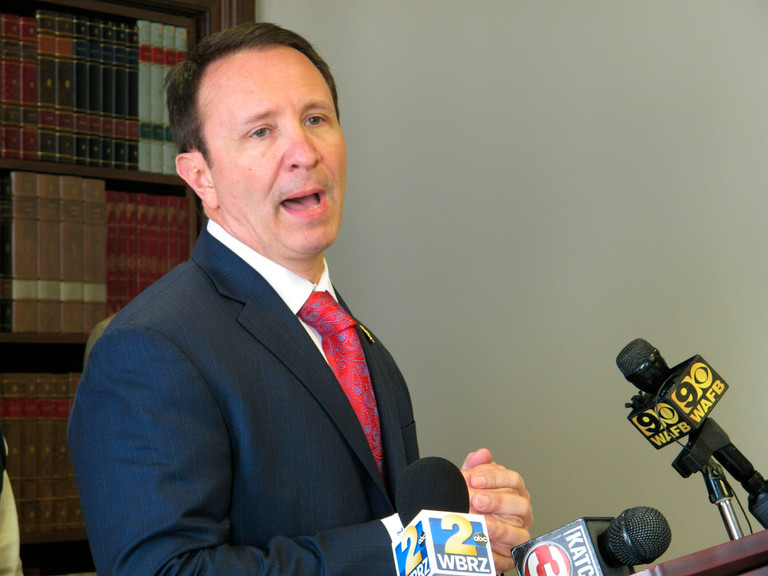
“Fauci’s recent deposition only confirmed what we already knew: federal bureaucrats in collusion with social media companies want to control not only what you think, but especially what you say,” said Attorney General Landry. “During no time in human history was this more obvious than during the COVID-19 crisis where social engineering tactics were used against the American public, not to limit your exposure to a virus, but to limit your exposure to information that did not fit within a government sanctioned narrative.”
According to the transcript, Dr. Fauci said “I don’t recall” 174 times, including when asked about emails that he sent, interviews that he gave, and other important information. cited https://ago.mo.gov/home/news/2022/12/05/missouri-louisiana-release-full-fauci-deposition-transcript
The full deposition transcript can be found here or here: https://ago.mo.gov/docs/default-source/press-releases/135885afauci112322_full_redacted.pdf?sfvrsn=35f4a425_2
Forgetful Fauci’s Deposition: All Those Lies Are Hard to Keep Straight
A
nthony Fauci’s penchant for misleading the public about COVID-19 may be heading into a federal courtroom soon, owing to a lawsuit brought by the Attorneys General of Missouri, Louisiana, and the New Civil Liberties Alliance. On November 23, 2022, Fauci sat for a sworn deposition about his own actions in directing the United States’ pandemic response. Consistent with his past media appearances, Fauci displayed a penchant for bending the truth to fit his own narrative and, more specifically, denied his own involvement in suppressing the Great Barrington Declaration (GBD) in October 2020. Only this time, it was under oath.
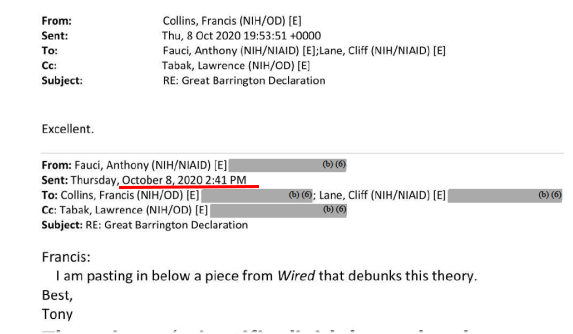 Just about a year ago, on the anniversary date of October 5, 2021 to be exact, we took what we thought would be our retrospective and dispassionate look at the GBD, as lockdowns dissipated and mask mandates faded away. Two months later, AIER discovered a shocking revelation in emails received from a Freedom of Information Act (FOIA) request to Fauci’s office. In early October of 2020, Dr. Francis Collins, then Director of the National Institutes of Health, ordered Fauci and his trusted lieutenant Clifford Lane to wage “a quick and devastating published take down (sic)” of the Great Barrington Declaration’s premises.
Just about a year ago, on the anniversary date of October 5, 2021 to be exact, we took what we thought would be our retrospective and dispassionate look at the GBD, as lockdowns dissipated and mask mandates faded away. Two months later, AIER discovered a shocking revelation in emails received from a Freedom of Information Act (FOIA) request to Fauci’s office. In early October of 2020, Dr. Francis Collins, then Director of the National Institutes of Health, ordered Fauci and his trusted lieutenant Clifford Lane to wage “a quick and devastating published take down (sic)” of the Great Barrington Declaration’s premises.
Armed with a federal judge’s order, the Attorneys General in the Missouri et al lawsuit finally got a chance to question Fauci about his involvement in these attacks on the GBD. They were specifically investigating whether Collins and Fauci’s actions contributed to censorship of anti-lockdown arguments under the “COVID misinformation” policies of social media companies such as Twitter, Facebook, and Google. Fauci, the man who since 2020 has promoted himself as “America’s Doctor” and a walking embodiment of “the science,” responded by denying he ever meaningfully engaged with the GBD.
Fauci was asked about his own role in Collins’ “devastating take down” directive, which ended with the NIH Director’s question “I don’t see anything on line yet – is it underway?” Fauci answered the Attorneys General with a bluntly stated denial about his own involvement:
No. This is not something I would be involved in. As I told you, I have a very important day job that is running a $6.4 billion institute. I would not be involved in examining this and doing something that would quote counter it.
The Attorneys General pressed him further on what Collins’s email meant, if not a directive for Fauci and Lane to prepare an attack. Fauci pleaded innocence, suggesting that Collins was “likely talking about writing a scholarly article to contest some of the premises” of the GBD.
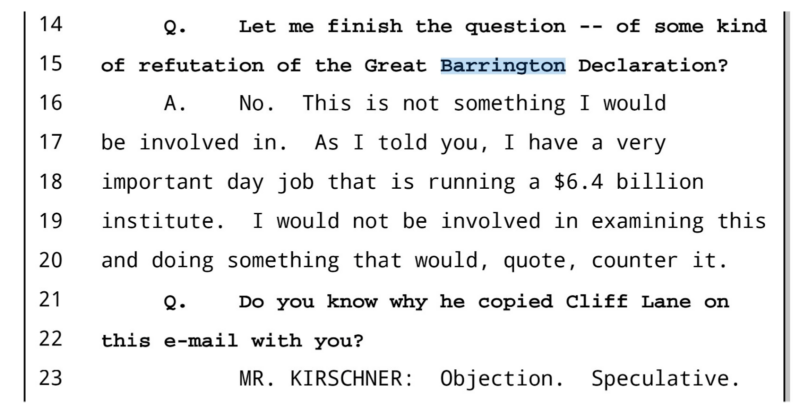
The problem with Fauci’s denials, and his speculation about an academic motive in Collins’ order, is that they are provably false. The original emails from AIER’s FOIA request show that Fauci and Collins jumped into action to smear and discredit the GBD in the media. They went directly to the national press, labeling its authors, Martin Kulldorff, Sunetra Gupta, and Jay Bhattacharya as “fringe epidemiologists” and branding the Declaration itself as “nonsense,” in Fauci’s words.
Fauci’s own answer to Collins came in an email sent a mere 10 minutes after he received the “devastating take down” order. Instead of examining the GBD’s scientific claims and making a scholarly counter-argument, Fauci enlisted the authority of a political writer with no scientific qualifications. He circulated an opinion piece from Wired Magazine, declaring the GBD false on the now-comical pretext that the lockdown phase of the pandemic was already behind us in October 2020. By then “three weeks to flatten the curve” had already become seven months, and there was no end in sight.
The email records show that Fauci and Collins quickly mobilized the national media against the GBD. Collins deployed the “fringe epidemiologists” line in an October 13, 2020 interview with the Washington Post. In a private email to Fauci, he boasted “my quotes are accurate, but will not be appreciated in the WH.” Fauci quipped in response that “they are too busy with other things to worry about this” – a possible reference to the fact that then-president Donald Trump tested positive for COVID a day earlier. But Fauci reiterated his agreement with Collins, stating “what you said was entirely correct.”
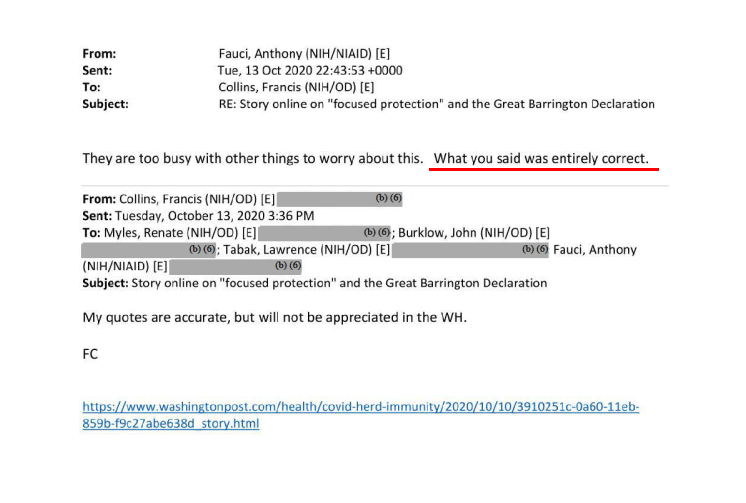
Fauci and Collins’ actions over the next several days
Fauci and Collins’ actions over the next several days show no signs of either man working on a scholarly article to answer the GBD in a scientific journal. They do, however, show the pair waging an aggressive campaign in the national news media to attack and discredit the GBD scientists. A day after Collins’s Washington Post interview, Fauci emailed his team in apparent response to a thread entitled “Quote re Barrington Declaration.” He likened the document to the “AIDS denialist days” of the 1980s – an ironic claim, given that Fauci himself spread egregious misinformation about the transmission of AIDS/HIV and sparked a panic that led to public discrimination against AIDS victims.
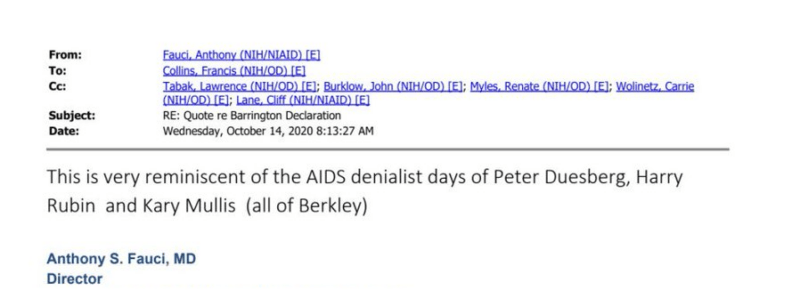
At this point, the correspondence between Fauci and Collins disappears behind the veil of redaction. The original set of emails contains a multi-page message between the pair containing the keywords “Great Barrington Declaration” and dated sometime between October 14 and 16, 2020 but it is completely blacked out. The NIH claimed that the email was exempt from FOIA because it contained material from unspecified private deliberations.
When the records resume on October 16, 2020, they contain a partially redacted email to Deborah Birx in which Fauci speculates that Scott Atlas, his anti-lockdown foil on the White House COVID Task Force, would attempt to sway the White House into endorsing the GBD. “Over the past week I have come out very strongly publicly against the “Great Barrington Declaration,” Fauci declared – an action that he conveniently has no memory of doing, according to his statements under oath from the Missouri lawsuit deposition.
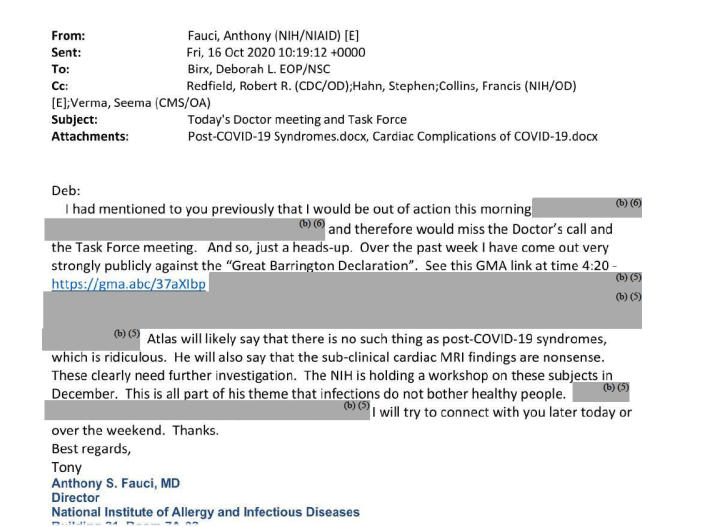
The Fauci-Collins onslaught against the GBD continued. At some point in the next week, Fauci apparently directed his chief of staff Greg Folkers to round up a list of political op-eds against the GBD. Folkers responded on November 2, 2020 in an email entitled “As discussed.”
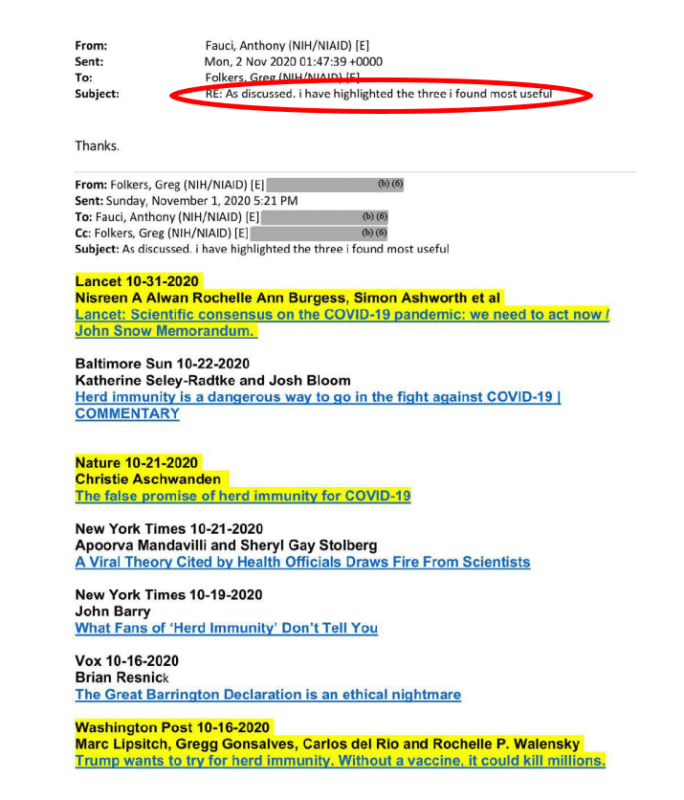
When the Attorneys General questioned Fauci about this request and its connection to the “devastating take down” order, his memory suddenly failed him. “I don’t recall,” Fauci answered. “Greg would probably send me something that I’ve asked for. So somehow, back then, a couple of years ago, I asked for articles concerning herd immunity and I believe he sent them.”
We will likely never know the full extent of the “take down” campaign due to the NIH’s heavy use of redactions and delay tactics to hide the contents of the requested emails. Their initial batch of FOIA documents stops in early November 2020. Just last week, AIER received a second batch of records from the agency covering Fauci and Collins’s correspondence in this same time period with their counterparts in the UK. A full 58 out of 61 requested pages of records were blacked out under specious invocations of FOIA exemption rules. The agency has yet to respond to our other FOIA requests, submitted almost a year ago.
That said, the email records we do possess contain ample evidence of Fauci’s involvement in the “take down” order, plainly contradicting his sworn deposition. In those emails we see Collins colluding with Anthony Fauci (while fantastically CCing Lawrence Tabak, Deputy Ethics Counselor at NIH) to craft talking points against the GBD in the media. Behind the scenes, we see them working with Deborah Birx to keep the GBD off of the White House COVID Task Force agenda. And we see Fauci’s instructions to Folkers to assemble a list of media op-eds attacking the GBD, with the apparent intent of parroting them back to the very same press as official talking points from the NIH.
Think about that for a minute. The Director of the National Institutes of Health all but ordered the Director of the National Institute of Allergy and Infectious Diseases to put together a smear campaign aimed at three distinguished scientists, each from an elite institution (Harvard, Stanford, and Oxford if you are keeping track at home), who were simply going where the science took them.
But Anthony Fauci decided that he himself was the representative of science, and no other opinions would be welcome in the public sphere.
And it’s really not much of a surprise now that Fauci wants to forget about all of this. It’s unseemly after all, that the Representative of Science would target fellow scientists trying only to do their jobs. But he will not be able to brush this mess under the carpet in his retirement from the NIH. As his recent performance in the sworn deposition indicates, Fauci’s evasions leave us with more questions than answers – and more clues that he used his position as a top official at a powerful government agency to persecute and suppress dissenting scientific beliefs.



